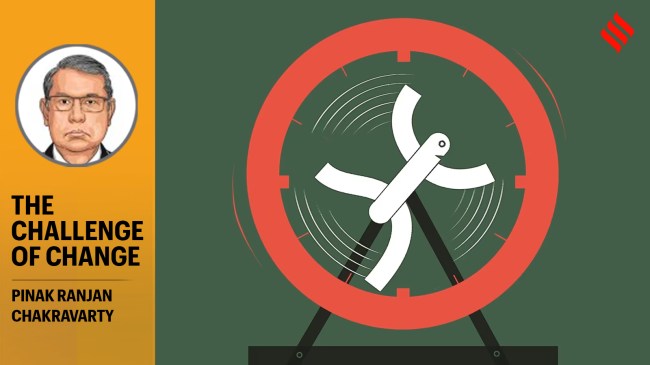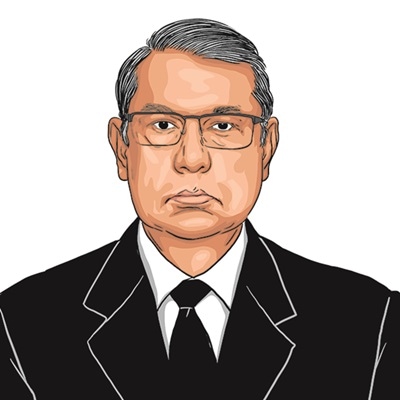Opinion The revolution’s promise is fizzling out in Bangladesh
Hundreds of factories have been closed because of the violence, investment has dried up, credit volume has declined, and employment has shrunk. The “new liberation,” touted by the Yunus-led IG, is yet to materialise.
 Rhetoric has failed to overcome reality. It is clear that neither the Awami League nor the Bangladesh Nationalist Party (BNP) will enter into any coalition arrangement with the NCP. (Illustration by C R Sasikumar)
Rhetoric has failed to overcome reality. It is clear that neither the Awami League nor the Bangladesh Nationalist Party (BNP) will enter into any coalition arrangement with the NCP. (Illustration by C R Sasikumar) The idiom from Greek mythology — between Scylla and Charybdis — best represents Bangladesh’s current political landscape, as the country continues to grapple with lawlessness, violence, and a tanking economy. Mobs seem to feel empowered and continue to flout the law. Banned Islamist organisations like Hizb ut Tahrir (HuT) are openly demonstrating on the streets, joined by other radical Islamists, in defiance of the security authorities. A student leader of the agitation and an adviser to Mohammad Yunus, who heads the interim government (IG), is known to be a member of the HuT. This adviser had hit the peak of nationalist rhetoric when he tweeted about annexing parts of West Bengal and other states in India’s northeast. Meanwhile, the student leaders have launched a new political party, hoping to take advantage of the fluid political situation. One of the leaders of the students’ agitation resigned from the IG to become the convener of the new party named Jatiyo Nagorik Party (National Citizens Party or NCP). Their declared mission is to adopt a new constitution and build a firewall against “constitutional autocracy.” Their promise to reshape the political framework of governance and build a new Bangladesh is yet another spike in political rhetoric. Yunus has reportedly played a role in promoting this party. History is witness to such parties born out of turmoil failing to make the grade.
Yunus lacks popular support. He has no experience in leading a national government but is known to have nurtured political ambitions after being awarded the Nobel Peace Prize in 2006. In 2007, under the army-backed caretaker government, he floated a political party, “Nagorik Shakti,” hoping to induct honest politicians and reform Bangladesh’s political culture. The party wound up after it failed to receive much support. As India’s High Commissioner from 2007-2010, I had to engage with the army-backed caretaker government. I met Yunus a few times and quizzed him about his political party. He was convinced that Bangladesh needed a new, honest political culture, which the “corrupt” mainstream parties were incapable of providing.
As the head of the IG, Yunus has failed to curb violence. In fact, he has been criticised for “justifying” the violence as legitimate and for rationalising violence against minorities as “political” and not “communal.” His detractors also blame him for giving a free hand to Islamists to capture institutions and ousting appointees of the Hasina government. The economic situation has increased the frustration among the people, who are struggling with rising living costs. Hundreds of factories have been closed because of the violence, investment has dried up, credit volume has declined, and employment has shrunk. The promised dividend of the so-called “revolution” and “a new liberation,” touted by the Yunus-led IG, has fizzled out. The people’s patience is running out.
In an unprecedented public statement, the army chief warned that infighting and violence had to stop, as it posed a threat to the country’s sovereignty. His remarks came after the demolition of Mujib’s house, a historic landmark in Dhaka. The IG failed to stop the bulldozer, and Yunus again seemed to justify the anger that led to this outrageous act. The army chief also ominously said that later no one should say that he did not warn them. He has supported the holding of early elections, which directly challenges the desire of the student leaders who want to retain power for an extended period of time to consolidate their position and chalk out a plan for their participation in the elections. The student leaders have pegged their position on the argument that reforms in the electoral system and governance will require time. The army is worried about its image and the perception that it has become ineffective at a time when the country is facing several challenges. A variety of domestic and international pressures have had their impact, and Yunus has announced that elections will be held between December 2025 and March 2026, 17-20 months after Hasina’s downfall. Yet, there is no definitive roadmap with dates. Procrastination seems to be the preferred policy option.
Nobel laureate Amartya Sen, a close friend of Yunus, has made public his concern about the turmoil in Bangladesh. His family’s origins are in East Bengal, and he maintains a soft corner for Bangladesh. Sen believes that Yunus is trying his best but has warned against any action to ban the Awami League (AL). The student leaders had wanted to ban the AL, blaming it for all the ills that had struck Bangladesh. The real purpose, however, was to remove the oldest and strongest political party from electoral politics to ease their path to power. The opposition to such a policy from important domestic institutions and political parties ensured that it did not fructify. Rhetoric has failed to overcome reality. It is clear that neither the Awami League nor the Bangladesh Nationalist Party (BNP) will enter into any coalition arrangement with the NCP. The BNP and several political parties have come out strongly in support of an early election, which has challenged the Yunus regime’s vacillation. In contrast, the JeI and Hefazat-e-Islam have clearly indicated their reluctance toward early elections and have advocated local elections to be held first. Ideologically, the radical outfits are focused on their agenda to make Bangladesh a Sharia-compliant Islamic state.
For India, Bangladesh is a major issue for its neighbourhood policy. Bilateral ties have gone downhill because of unwarranted rhetoric from the IG, catalysed by India’s support of the Hasina government. Hatred and rhetoric cannot replace the reality of geopolitics and geoeconomics. The Yunus-led regime has climbed down from the rhetorical height to a more realistic level. It’s not clear if Donald Trump’s assumption of office in the US has changed America’s equation with Bangladesh.
There is rising anger in Bangladesh over India cutting the number of visas issued to Bangladeshis. This anger is being directed at the IG. Thousands of Bangladeshis travel to India for medical treatment and tourism. Financial pressure is mounting regarding the upkeep of over a million Rohingya refugees, as the UN has halved its food aid to the Rohingyas. While both Yunus and the foreign adviser have voiced support for good relations with India, they have also upgraded ties with Pakistan. Islamists in Bangladesh have yearned to embrace their “long-lost” brother Pakistan. China has been avidly wooing the IG and the JeI, indicating its perception of which way the political wind is blowing and its policy of containing India. These ongoing challenges for India’s neighbourhood policy are not new but have implications for India’s security. Bangladesh should be careful about crossing red lines.
The writer is a former Indian diplomat who served as Secretary in the Ministry of External Affairs. He has served as the Deputy High Commissioner and later as High Commissioner to Bangladesh





